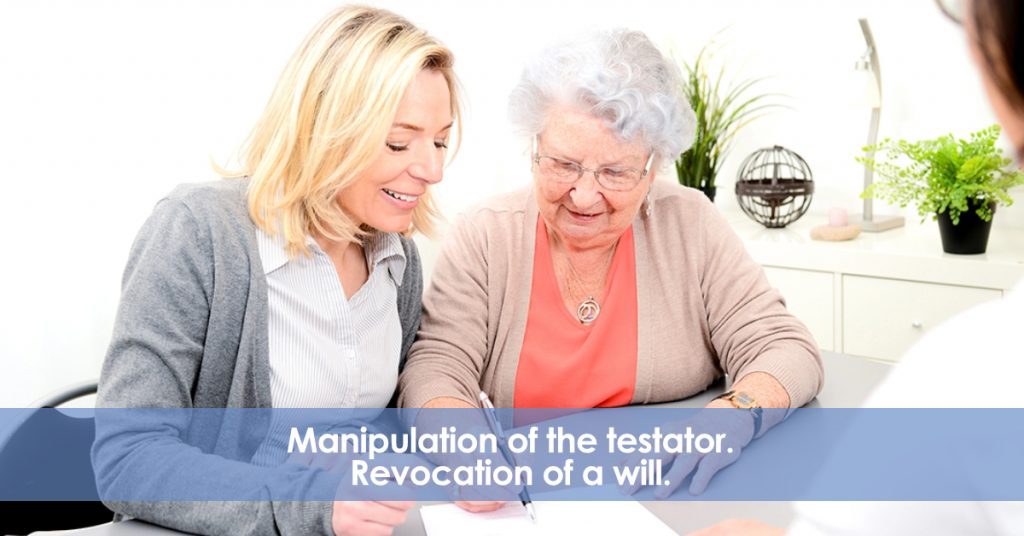Inheritances are often a source of conflict between the persons called upon to inherit. The way in which the assets are to be distributed, the valuation of each one of them. The dispositions that the deceased left in his/her will before death. Etc. Unfortunately, contesting wills and contentious inheritances happen every day. In today’s article we would like to analyse the figure of testamentary deceit or manipulation of the testator. What it consists of. Requirements. And consequences.
Testamentary deceit in the Spanish Civil Code (CC).
The only mention of testamentary deceit in the Spanish Civil Code can be found in article 673, which states that: “A will granted with violence, fraud or deception shall be null and void”. Beyond this brief mention, there are no other provisions that detail and regulate the cases of manipulation of the testator or “testamentary malice”. However, over the years, numerous rulings of the Spanish Supreme Court (TS) have gradually shaped this concept. And the requirements that must be met for it to be appreciated.
Concept of “testamentary deception” according to the Spanish Supreme Court.
According to the case law of the TS (STS. 686/2014 of 25 November, among others) testamentary deceit consists of: use of insidious words or scheming that induce a person to grant a will different to the one he/she would have granted if such interference had not taken place.
The insidious interference is usually the product of a prolonged action to bend the will of the testator. And it must be of a sufficient degree or intensity to capture the testator’s mindset towards a certain disposition. Furthermore, there must be a causal relationship between the artifice and the result.
Requirements of testator manipulation.
In order to prove the existence of testamentary manipulation, the following requirements must be met:
1.- The malice must be serious. In other words, it is not sufficient to overwhelm someone with attention or care in order to try to direct his/her will or obtain his/her favour (what is known as “good deceit”).
2.- There must be a clear causal relationship between the scheming and the testamentary disposition.
3.- Manipulation must be proven, in no case is it presumed.
4.- The existence of manipulation of the testator can be accredited by any means of proof valid in law, including presumptive evidence.
In short, until proven otherwise, a will must be considered valid. The only way to overturn this is to provide sufficiently strong evidence to the contrary. That is to say, it must enable the court to conclude that the wishes reflected in the will did not coincide with the actual will of the testator.
Legal consequences of testamentary deceit.
If the court understands, through the evidence provided, that there has been manipulation of the testator, the result is clear: the will is declared null and void in accordance with Art. 673 of the CC. In the event of a pre-existing will, that would be the one that governs the succession. If there was no other will, an intestate succession would have to be opened.
Unworthiness to succeed under Article 756 of the Spanish Civil Code.
As we will explain in more detail in another article, testamentary manipulation cannot be confused with the so-called “unworthiness to succeed” provided for in Art. 756.5 of the CC:
“They are incapable of succeeding by reason of unworthiness: 5º He/she who, by threat, fraud or violence, forces the testator to make a will or change it”.
Conclusions.
Testamentary deception or “manipulation of the testator” is a legal concept that, despite not being regulated in detail in the Spanish Civil Code, has been defined and delimited by abundant case law. At White-Baos Lawyers we are experts in testamentary law and will contestation. If you believe that a relative may have been “manipulated” into making a will, please do not hesitate to contact us. We will study your case and offer you expert advice on the subject.
The information provided in this article is not intended to be legal advice, but merely conveys information relating to legal issues.
Carlos Baos (Lawyer)
White & Baos.
Tel: +34 966 426 185
E-mail: info@white-baos.com
White & Baos 2023 – All Rights Reserved.
